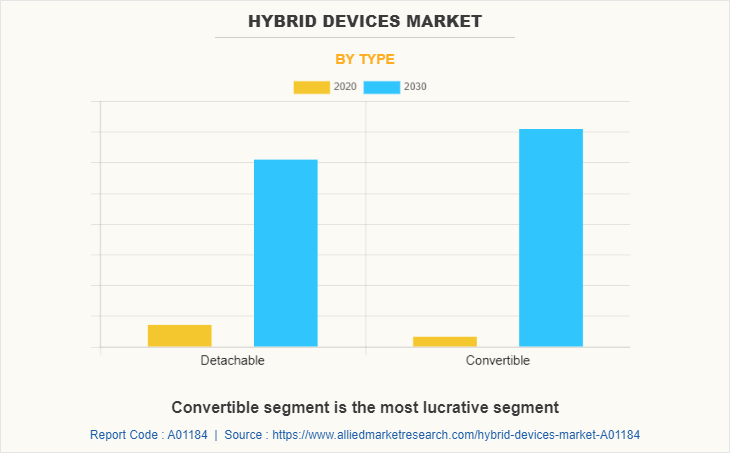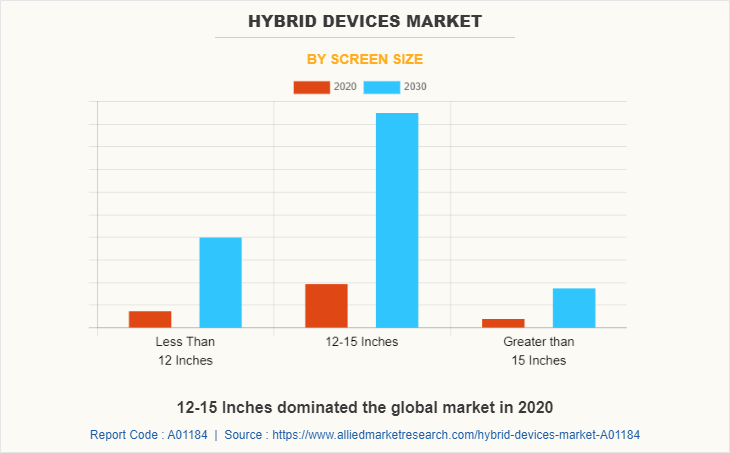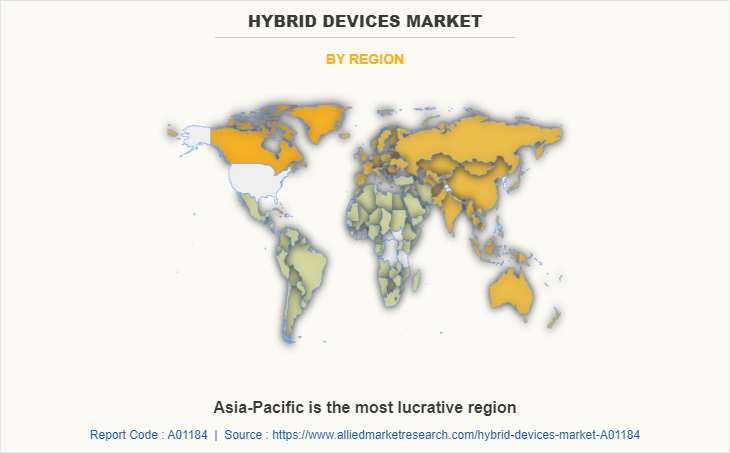Hybrid Devices Market Research, 2030
The global hybrid devices market was valued at $30.06 billion in 2020, and is projected to reach $151.88 billion by 2030, growing at a CAGR of 17.6% from 2021 to 2030. Over the years, desktops and laptops were given utmost importance, owing to presentation of information and other generic functions that they perform. However, technological developments in functionalities and mobility of computers have led to a shift from traditional to hybrid devices among end users. Hybrid devices associate the productivity and functionalities of a laptop with the similar functionality of a tablet in a single device. These devices are differentiated into convertible and detachable hybrid devices.
Major growth drivers of the hybrid devices market size include high demand for devices with longer battery life, an increase in acceptance of hybrid devices for enterprise mobility, and the use of touchscreen technology.

Segment Review
The hybrid devices market is segmented on the basis of type, screen size, end user, and region. Depending on the type, the market is divided into convertible hybrid devices and detachable hybrid devices. On the basis of screen size, it is divided into less than 12 inches, 12–15 inches, and greater than 15 inches. On the basis of end-user, it is divided into personal use, IT & telecom, educational institution, healthcare, and others. On the basis of region, it is analyzed across North America, Europe, Asia-Pacific, and LAMEA.

In 2020, on the basis of type, the detachable hybrid devices segment dominated the hybrid devices market share, and is expected to maintain its dominance in the upcoming years. In the current scenario, detachable hybrid devices are manufactured with detachable hinges, adjustable stands, and a design best-suited for higher productivity and portability. Currently, Lenovo, a leading provider of PCs globally, devised a new hybrid devices market trends in detachable devices. The Lenovo Yoga Tab 3 Pro has a hinge with a central hole for hanging the device on a wall. Moreover, it also has a tilt mode for easier typing and for projecting the device through its built-in projector. For instance, in January 2022, Acer launched new chromebooks-314,315, and 513 designed for consumers that need a secure, easy-to-use, and affordable device for productivity, entertainment, and communication.

On the basis of screen size, the 12-15 inches segment dominated the hybrid devices market growth in 2020, and is expected to maintain its dominance in the upcoming years. This is because of the industry players are focused towards implementation 12-15 inches screen devices in the market as it is the largest segment and is sold universally. However, the less than 12 inches segment is expected to witness the highest growth rate during the forecast period, as it is attributed to factors such as increase in devices with lower screen size for the users who are looking to keep the devices in conjusted places.

North America is a rapidly growing region in the global hybrid devices industry, in terms of technological advancements and adoption. It possesses a well-equipped infrastructure and the ability to afford hybrid device solutions. Furthermore, the higher purchasing power of North Americans has been the major growth potential for the hybrid devices market in the region. The devices in the premium and ultra-premium range have immense opportunities in the region.
However, Asia-Pacific is expected to be the fastest-growing regional segment during the forecast period, with the highest CAGR. Leading players are focusing on Asia-Pacific to increase their business as the region is expected to witness high growth in the deployment of hybrid devices. Moreover, consumers in Asia-Pacific demand higher productivity and enhanced multimedia in their devices. Hence, hybrid devices are highly adopted by people in this region, owing to the productivity and entertainment demands. One of the major growth propellers for hybrid devices industry in the region include increase in number of internet users.
Top Impacting Factors
High demand for devices with longer battery life
In the current scenario, while hybrid devices have more powerful processors, some devices employ atom quad-core processors. Atom quad-core processors instantly launch apps and widgets without exhausting the battery life of the device. Moreover, the best flip-screen hybrid devices have become unusually powerful, with the latest device in the market offering a battery life of up to 8–12.5 hours per charge.
A rise in acceptance of hybrid devices for enterprise mobility
An enterprise mobility strategy is all about addressing the needs of employees and user groups. Hybrid devices provide exceptional features for business users such as effortless touch input for browsing, reviewing, presenting, and collaborating files and documents. Moreover, these devices portray longer battery life, faster wake times, built-in security features, and remote manageability that are ideal for enterprise mobility. In addition, many devices come with a stylus with pinpoint precision. Hence, there is increasing adoption of hybrid devices for enterprise mobility, owing to the productivity and flexibility level that they offer in a business environment.
COVID-19 impact analysis
The current estimation of 2030 is projected to be higher than pre-COVID-19 estimates. The IT sector has flourished as the individuals are shifting towards the digital solutions. Moreover, the escalating demand for effective, user-friendly, agile, and scalable computing solutions and improved business mobility is creating a positive outlook for the market during pandemic. The rising adoption of the work-from-home model has led to the emerging need for computing devices for browsing, examining, and presenting files and data across organizations, which is contributing to the market growth.
Key Benefits for Stakeholders
- This report provides a quantitative analysis of the market segments, current trends, estimations, and dynamics of the hybrid devices market analysis from 2020 to 2030 to identify the prevailing hybrid devices market opportunities.
- The market research is offered along with information related to key drivers, restraints, and opportunities.
- Porter's five forces analysis highlights the potency of buyers and suppliers to enable stakeholders to make profit-oriented business decisions and strengthen their supplier-buyer network.
- In-depth analysis of the hybrid devices market segmentation assists to determine the prevailing market opportunities.
- Major countries in each region are mapped according to their revenue contribution to the global market.
- Market player positioning facilitates benchmarking and provides a clear understanding of the present position of the market players.
- The report includes an analysis of the regional as well as global hybrid devices market trends, key players, market segments, application areas, and market growth strategies.
Hybrid Devices Market Report Highlights
| Aspects | Details |
| By Type |
|
| By Screen Size |
|
| By End User |
|
| By Region |
|
| Key Market Players | Lenovo, ASUS, HP Development Company, L.P., Toshiba Corporation, LG Corporation, Fujitsu Limited, Dell, Inc., Samsung Electronics Co. Ltd., Acer, Inc., Microsoft Corporation |
Analyst Review
In accordance with the insights by CXOs of leading companies, the hybrid devices market signifies a promising growth for the PC industry. The current business scenario has witnessed a surge in adoption of these devices in developed as well as developing regions. Companies adopt efficient techniques in an effort to provide customers with advanced and innovated product offerings.
Hybrids have remained largely concentrated in the personal use and business sector, however, with the widespread awareness of these devices, various sectors such as IT & telecom, educational institutions, retail, healthcare, and government are increasingly adopting these devices. PC vendors around the world are progressively heading toward hybrid devices as these devices show immense growth potential. However, the technology and features vary from product to product.
Among the types of hybrid devices, the detachable segment exhibits the highest revenue growth, owing to transformation of devices into a lightweight tablet by making the keyboard separable from the device. However, convertibles are expected to grow at a relatively faster rate, owing to various modes that they offer for viewing as well as provision of battery space for extended battery life.
Among the regions, Asia-Pacific exhibits the highest adoption of hybrid devices. In Asia-Pacific, hybrid devices are highly adopted by people, owing to productivity and entertainment demands. In addition, increase in number of internet users is one of the major growth factors for hybrid devices in the region. On the other hand, LAMEA is expected to grow at a faster pace, predicting a lucrative market growth for such devices.
The global Hybrid Devices market was valued at $30.06 billion in 2020, and is projected to reach $151.88 billion by 2030, registering a CAGR of 17.6% from 2021 to 2030.
North America dominated the global hybrid devices market, in terms of technological advancements and adoption.
Personal use is the leading application in Hybrid Devices Market.
Key impacting factors of the hybrid devices are high demand for devices with longer battery life, increasing acceptance of hybrid devices for enterprise mobility, and use of touchscreen technology.
The key players operating in the market are: ASUSTeK Computer Inc., Lenovo, HP Development Company, L.P., Microsoft, Dell Inc., Toshiba Corporation, Samsung Corporation, Acer Inc., Fujitsu Ltd, and LG Corporation.
Loading Table Of Content...



